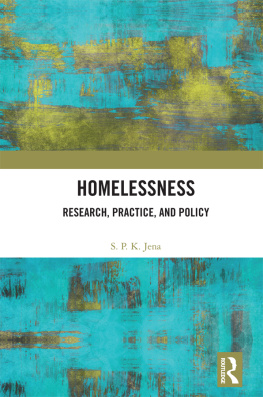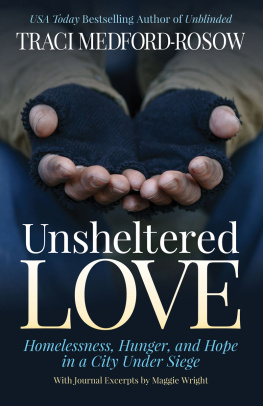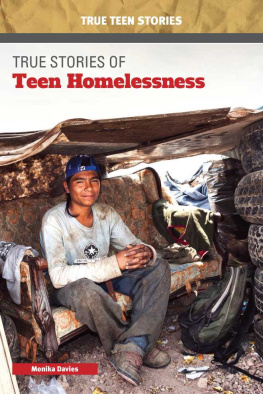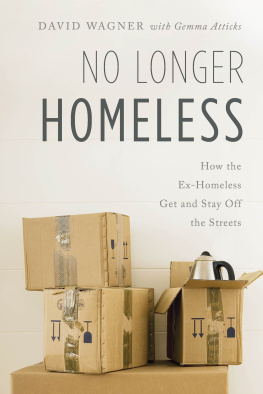
The author and publisher have provided this e-book to you for your personal use only. You may not make this e-book publicly available in any way. Copyright infringement is against the law. If you believe the copy of this e-book you are reading infringes on the authors copyright, please notify the publisher at: us.macmillanusa.com/piracy.
To Cliff Hexamer, Steven Saylor, Wendy Lesser, and, of course, Lizbeth
CONTENTS
INTRODUCTION
When I began this account I was living under a shower curtain in a stand of bamboo in a public park. I did not undertake to write about homelessness, but wrote what I knew, as an artist paints a still life, not because he is especially fond of fruit, but because the subject is readily at hand.
In the summer of 1989, when I was in the bamboo, I supposed interest in homelessness had peaked in the presidential election of the previous year. Moreover, I thought my experiences with homelessness were atypical.
I still think my experiences were atypical, but I have come to disbelieve in typical homelessness. I had some advantages and some disadvantages and I chose the course that seemed most likely to provide the survival of myself and my dog Lizbeth on the most comfortable terms of which our situation would admit.
I did not often associate with other homeless people. I avoided the homeless shelters and hobo jungles. I did not attempt to survive on the streets of a very large city, but made my way for the most part in a liberal and affluent area of an overgrown college town. Although I often despaired of improving my material situation, I seldom lacked for a feeling of self-worth or a sense of mission. On the other hand, I spent most of my time in Texas, where a general contempt for the poor is reflected in a useless, vestigial social welfare system. I handicapped myself by adopting from the first a policy of not stealing and not begging on the streets. And, of course, I would not be parted from Lizbeth. I do not pretend to speak for the homeless. I think no one could speak for all the various people who have in common the condition of being homeless. I do not know many of the homeless, but of the condition of being homeless I know something, and that is part of what I have written about.
In truth, becoming homeless was a long process that I can date only arbitrarily. I had been without a reliable income for about a year before I left the shack I had been living in. For about five months after I left the shack I traveled and imposed on friends and strangers, so that I spent only part of the time on the streets. Moreover, throughout that first period I believed I had one prospect or another of improving my situation and I did not regard myself as truly homeless.
When I had the opportunity to get off the street for a week or a month or even for only a night, I did so; my object was not to explore homelessness but to get off the street. I have recounted these events in the ordinary narrative manner, but have only summarized the events of my longer stopovers. Eventually I became homeless enough to suit anyones definition. In spite of the challenges that homelessness presented, the chief characteristic of my experience of homelessness was tedium. The days and nights that Lizbeth and I were literally without a roof over our heads, although by far the majority of the more than two years encompassed here, are represented by relatively few examples. One of those days was so much like each of the others that to call any of them typical would be an understatement. Our immediate needs I met with more or less trouble, but once that was done I could do no more. Day after day I could aspire, within reason, to nothing more than survival. Although the planets wandered among the stars and the moon waxed and waned, the identical naked barrenness of existence was exposed to me, day in and day out. I do not think I could write a narrative that would quite capture the unrelenting ennui of homelessness, but if I were to write it, no one could bear to read it. I spare myself as much as the reader in not attempting to recall so many empty hours. Every life has trivial occurrences, pointless episodes, and unresolved mysteries, but a homeless life has these and virtually nothing else. I have found it best in some parts to abandon a strictly chronological account and to treat in essay form experiences that relate to a single subject although they occurred in disparate times and places.
I have changed the names of people and of institutions throughout this account. I know my perspective did not often reveal the best side of people. When it did, I think I best return the favor by respecting the privacy of those who helped me. At any rate, I thought to name some and not name others would imply a criticism of those not named that, in some cases, I did not intend.
Any homeless life entails certain dangers and discomforts. I have tried not to make too much of these, for I suppose people who have always lived in comfort will imagine the worst. In fact, my homelessness involved far more mundane annoyances and petty irritations than terrors and pains.
Sometimes I escaped into daydreams la Walter Mitty. I amused myself at night by studying the stars, and by day I read cast-off astronomy, paleontology, and philosophy books. No one will ever know if I become senile. Since childhood I have had the tendency to be absentminded, abstracted, and off in another world. Thus, I not so much became accustomed to minor physical discomforts as I often failed to notice them. Perhaps this was not all to the good, for had I been less abstracted I might have been driven to measures that would have altered my situation in one way or another.
I must say something of Lizbeth.
She seemed not to suffer much, so long as we had a bedroll for her to lie upon. She liked softness and warm places. She seemed to be compensated for all the discomforts of our new life by being constantly near me.
Although as a puppy she had shown an aptitude for amusing herself, she loves human attention and like Brownings duchess she is pleased indiscriminately whencesoever it comes. In this she frustrates herself because she seeks attention by barking in a way that people who know little of dogs interpret as threatening. In the ultimate she prefers to sleep at her masters feet, but being constantly at leash-length from anyone would please her. With few exceptions, this was a great adventure for her.
For my part, I must admit, the romantic and timeless aspects of a man and a dog seeking their sustenance together, relying on each others special abilities for survival, and accompanied by the ghosts of all such pairs that have hunted together since man and wolf were first alliedthat was not lost on me.
I often write or say we, meaning Lizbeth and I. Some people find this peculiar, but I fail to see why. I do not say we planned, we hoped, or we thought, because I do not think that way. I do say we walked, we camped, and we slept. I do not anthropomorphize Lizbeth in my mind or in my words.
While it is perfectly evident to me when Lizbeth is happy, bored, tired, or thirsty, I do not write clever things she is supposed to have thought. I do talk to her and say to her some things I think are witty, but I certainly do not suppose that she apprehends anything more than I am paying attention to her and whatever she may gather from my tone of voice.
My point is that the relationship between me and Lizbeth is that of man and dog. That I have made some sacrifices to avoid abandoning her or having her put to death in her youth seems to me entirely within the proper scheme of the relationship of man and dogmy proper performance under an ancient interspecies contract.









